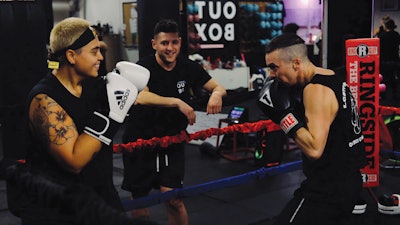
Going to the gym can be an intimidating experience for just about anyone, even the fittest among us. It’s a place of vulnerability, where we work up a sweat and push our bodies to their limits in front of strangers and, in many cases, surrounded by mirrors. Now imagine being part of the LGBTQ+ community, which finds its members at the center of a particularly heated and public debate.
When Max Adler founded OutBox, a fitness and boxing gym in Brooklyn, N.Y., he was looking to create a safe space where LGBTQ+ members within his larger community can train and workout comfortably. Adler, who recently transitioned from female to male, has worked at various boxing gyms in New York City, including Church Street Boxing and Everybody Fights, and has trained under champions at legendary gyms such as Gleason’s and Mendez Boxing.
Adler says that after transitioning, he just couldn’t find any comfortable spaces where queer and trans people could train and work out, noting that there’s more to what he was envisioning than just a place where his community was tolerated, which he’d seen plenty of times.
“I saw what I didn’t want,” Adler says. “I didn’t want gendered locker rooms. I didn’t want gendered language in the gym. I didn’t want people to be misgendered in the gym, and I wanted trans people to participate front and center and be celebrated here and not left out.”
OutBox was the result of Adler’s mission. The brick-and-mortar gym offers a workout space with treadmills, cable machines, weights, barbells and ellipticals for people who just want to work out, as well as boxing classes, weightlifting classes and personal training.
Adler says the response to OutBox has been extremely positive, and about 99 percent of his members are part of the LGBTQ+ community.
“It’s been incredible. Our classes are full, and it seems like there’s no shortage of people who need inclusive training,” Adler says. “And every day we get a different kind of inquiry to host something, whether it’s self-defense, or other queer instructors want to do classes here, and we host community events. So, it feels like it’s growing every day.”
When asked whether he has plans to open another space, Adler says not at the moment, but he adds that there’s definitely a need for more places like OutBox.
“Everyone who comes in from out of town asks if there’s another one somewhere else,” Adler says. “And a lot of people also message me and ask me if I know of any other inclusive gyms elsewhere, and honestly, I really don’t. Yeah, I know there’s one in L.A. called Everybody, but that’s for the entire country, I can really only name like, maybe one or two other queer-owned places — and not queer-friendly, actually for queer people, because there is a difference. There’s tolerance of queer people and then there’s queer-centered spaces.”
Given the current discourse in the public sphere around participation of transgendered people in sports, it’s easy to see why Adler saw a need for a place like OutBox. He says that while there’s a big difference between what he’s doing and what’s happening in athletics, the sentiment being expressed by some might leave members of the LGBTQ+ community feeling that they’re not wanted in certain spaces.
“It sends a message to us that they don’t want trans people in sports,” Adler says, “and the way trans people enter sports is through training at gyms and on sports teams. So, it’s like a barrier to entry right from the start. I’m just creating a space where trans people can come in, work out and feel comfortable and accepted.”





































